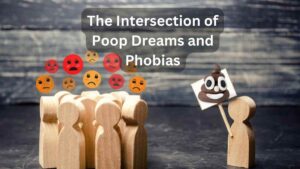Coprophobia is an intense, irrational fear of feces or anything related to feces. It’s a rare but real condition that can significantly impact a person’s life.
Prevalence: While not commonly discussed, coprophobia affects a small percentage of the population, with varying degrees of severity.
Understanding Dreams
The Psychology of Dreaming: Dreams are a way for our subconscious to process emotions and experiences. They can be influenced by our daily lives, fears, and aspirations.
Common Themes in Dreams: Dreams often contain symbols and themes that represent deeper psychological concepts. Understanding these can provide insights into our mental state.
Analyzing Poop Dreams
Symbolism of Poop in Dreams: In dreams, poop can symbolize a range of things from wealth to the need to release suppressed emotions.
How Poop Dreams Relate to Anxieties: For some, dreaming about poop can be a manifestation of underlying anxieties or fears.
Exploring Coprophobia
Causes of Coprophobia: This phobia can stem from past traumatic experiences, cultural beliefs, or even a general disposition towards anxiety.
Symptoms and Diagnosis: Coprophobia can manifest in physical symptoms like nausea and panic attacks, making diagnosis crucial for management.
Connection Between Poop Dreams and Coprophobia
Psychological Analysis: There’s a fascinating interplay between the symbolism of poop in dreams and the fear experienced by those with coprophobia.
Case Studies: Examining individual cases can shed light on how these two phenomena intersect.
Coping Mechanisms
Professional Therapy: Cognitive-behavioral therapy and exposure therapy are effective treatments for phobias, including coprophobia.
Self-Help Strategies: Mindfulness, relaxation techniques, and education can also help manage symptoms.
Cultural Perspectives on Poop Dreams and Coprophobia
Historical Viewpoints: Different cultures have various interpretations of poop in dreams, ranging from positive omens to signs of bad luck.
Cultural Differences: The perception and impact of coprophobia can vary significantly across different cultures.
The Role of Media in Shaping Perceptions
Influence of Film and Literature: Media representations can both normalize and stigmatize phobias, affecting public perception.
Social Media Impact: Social media platforms often serve as a double-edged sword, providing support networks while sometimes perpetuating misinformation.
Expert Opinions
Interviews with Psychologists: Insights from mental health professionals provide a deeper understanding of these complex topics.
Recent Research Findings: Ongoing research continues to uncover more about the nature of dreams and phobias.
Personal Stories
Real-life Experiences: Personal anecdotes offer a unique perspective and help in demystifying these conditions.
Overcoming Challenges: Stories of resilience and recovery can inspire and offer hope to those affected.
Prevention and Education
Importance of Awareness: Raising awareness is key to preventing misunderstandings and stigma related to coprophobia.
Educational Programs: Educational initiatives can help in spreading accurate information and encouraging empathy.
Future Directions in Research
Upcoming Studies: The future of research in this field holds promise for new insights and better treatment options.
Potential Discoveries: Advancements in psychology and neuroscience could lead to groundbreaking discoveries in understanding and treating coprophobia.
Checkout my article on The Intersection of Poop Dreams and Phobias: Understanding Coprophobia
Conclusion
In conclusion, the intersection of poop dreams and coprophobia offers a fascinating glimpse into the human psyche. Understanding these phenomena requires a multidisciplinary approach, encompassing psychological, cultural, and personal perspectives.
FAQs
- What triggers coprophobia?
- Coprophobia can be triggered by past traumatic experiences, cultural influences, or other psychological factors.
- Can therapy help with poop dreams related to coprophobia?
- Yes, therapy, especially cognitive-behavioral therapy, can be effective in treating phobias and related dream disturbances.
- Are there specific cultures that view poop dreams positively?
- Yes, some cultures view poop dreams as symbols of good fortune or impending wealth.
- How common is coprophobia?
- While exact numbers are hard to determine, coprophobia is considered a rare condition.
- Can children develop coprophobia?
- Yes, children can develop coprophobia, often due to negative experiences or learned behaviors from adults.


Pingback: Dreaming of Poop in Different Textures and States: Guide